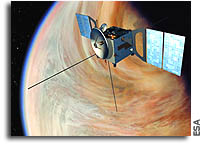ESA Venus Express Status Report: Orbital Control Manoeuvres

ESA Venus Express Status Report: Orbital Control Manoeuvres
24 Apr 2006 10:13
Report for period 14 April – 20 April 2006
The 9-days capture orbit has been successfully completed with the first of five Apocentre Lowering Manoeuvres on DoY 110 at about 08:00 UTC (200 ms-1). This manoeuvre has set the spacecraft onto an orbit with a period of about 40 hours and an apocenter altitude of 99 000 km.
This manoeuvre has been executed at the pericenter of the capture orbit that, with a Pericentre Control Manoeuvre (5.8 ms-1) executed on DoY 105 at about 18:30 UTC, had been set to 257 km.
All the six science observations planned for the capture orbit have been executed and performance of the spacecraft and of the instruments has been outstanding throughout the reporting period as the one of the ground segment.
The table below shows a chronology of the main activities in the reporting period:
| MET (Day) | Date | DOY | Main Activity |
| 157 | 14/04/06 | 104 | 3rd Science observations (COB02) |
| 158 | 15/04/06 | 105 | Pericentre Control Manoeuvre #1 Delta V = 5.8 ms-1 |
| 159 | 16/04/06 | 106 | 4th Science observations (COB03) |
| 160 | 17/04/06 | 107 | 5th Science observations (COB04) |
| 161 | 18/04/06 | 108 | 6th Science observations (COB05) |
| 162 | 19/04/06 | 109 | Spacecraft Monitoring |
| 163 | 20/04/06 | 110 | Apocentre Lowering Manoeuvre #1 Delta V = 200 ms-1 |
At the end of the last Cebreros pass in the reporting period (DOY 110, 14:00) Venus Express was orbiting Venus at 132 millions km from the Earth. The one-way signal travel time was 441 seconds.
Spacecraft Status
AOCS
A Pericentre Control Manoeuvre (5.8 ms-1) has been executed on DoY 105 at 18:30. The onboard estimated delta-V was 5.0859 ms-1. The burn duration was 504 seconds.
The Main Engine has been fired on DoY 110 for the first apocenter lowering. The on-board estimated delta-V was 200.298 ms-1. The burn duration computed on-board was 379 seconds.
Payload Activities
ASPERA
The instrument has been successfully operated as part of the COB04 observation.
MAG
The instrument is ON and will be commissioned on DoY 112.
PFS
The instrument is OFF.
SPICAV
The instrument has been successfully operated during observations COB02, 03, 04, and 05. Science data are being analysed by the PI team.
VeRA
The USO is kept powered but muted.
VIRTIS
The instrument has been successfully operated during observation COB02, 03, 04, and 05. Science data are being analysed by the PI team.
VMC
The instrument has been successfully operated during observations COB02, 03, 04, and 05. Science data are being analysed by the PI team.
Ground Facilities
During the reporting period Venus Express has been supported by daily passes with Cebreros and additional passes from New Norcia.
Future Milestones
The spacecraft is now in the apocentre lowering phase and currently in a 40-hour orbit. After 2 revolutions on this orbit another firing of the Main Engine (104 ms-1, ALM#2) on 23 April will bring down the period to about 26 hours and the apocenter altitude to 70 463 km. This will be the last firing of the Main Engine.
The next manoeuvre (ALM#3, 10 ms-1, 26 April) will be executed with the 10 N thrusters. The Venus Orbit Commissioning will start on 22 April with MAG real-time operations and VMC out of pass observation. Payload operations will be interleaved throughout the orbit insertion phase with manoeuvres required to reach the target operational orbit on 7 May.








